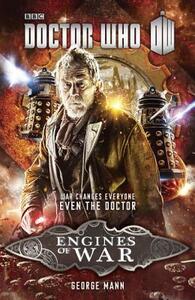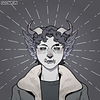Take a photo of a barcode or cover
3.5
My general feeling on TV-tie-in novels is that they are really fun to read, especially if you've seen all of the episodes of the show and want more, but usually not "great literature." That holds true for Engines of War, but this one does have a little something extra: the Time War. Fans of the series will have heard about this mysterious war, but only one episode was devoted to John Hurt's "War Doctor." The book takes us back to those days, pitting the Time Lords of Gallifrey against the Daleks, and showing us that we can't really root for either side. Among the tie-in books I've read, this is unique in that it does actually add something to the mythos of the show, rather than just being a one-off adventure. Fans of the new series will definitely want to check this one out.
I received my copy free from NetGalley.
My general feeling on TV-tie-in novels is that they are really fun to read, especially if you've seen all of the episodes of the show and want more, but usually not "great literature." That holds true for Engines of War, but this one does have a little something extra: the Time War. Fans of the series will have heard about this mysterious war, but only one episode was devoted to John Hurt's "War Doctor." The book takes us back to those days, pitting the Time Lords of Gallifrey against the Daleks, and showing us that we can't really root for either side. Among the tie-in books I've read, this is unique in that it does actually add something to the mythos of the show, rather than just being a one-off adventure. Fans of the new series will definitely want to check this one out.
I received my copy free from NetGalley.
I received an ARC of this book from the publisher via NetGalley, in exchange for an honest review. This in no way influences my opinions as stated below.
Most Doctor Who novels are fairly lightweight, intended to fill in gaps between episodes and entertain without interfering with the overall "canon” as established in the continuity of the television show. Engines of War, however, is a little different. It still operates as a standalone adventure, but it has to carry more weight than many previous books, as it takes place during one of the most significant events in the entire Whoniverse: the Time War. Not only this, but it also focuses on an incarnation of the Doctor that has received very little screen time, and thus has little in the way of established characterization to work with.
Mann does an admirable job balancing so little previous character development and so much expectation. The War Doctor is the most hardened and merciless incarnation, so it makes sense that this story is somewhat more disturbing and dark than previous adventures I have encountered in the New Series; there are some graphic descriptions of abuses perpetrated by both the Daleks and the Time Lords that would feel out of place in many other entries. While these things may set it apart, the story itself does follow the traditional pattern of Who novels: the Doctor arrives accidentally on a planet, acquires a companion (if he doesn’t already have one along for the ride), discovers a dastardly plot, and works with his companion to attempt to foil said plot.
In this instance, the Doctor lands on the planet Moldox, part of a system of colonized worlds that orbit an anomaly known as the Tantalus Eye. He meets a young rebel fighter named Cinder, and with her help, discovers key information about the next phase of the Dalek war strategy. But since this is the great Time War, rather than using his newly discovered intel to defeat the enemy himself, the Doctor spirits Cinder away with him to Gallifrey, and that is where things get really interesting.
Perhaps one of the defining features of the reboot series Doctor Who is that it takes place following the Time War. This has not only profoundly shaped the character in every new permutation, but the shape of the universe in which he resides; the Time Lords have weighed on the Doctor’s conscience and shaped his choices, and by extension those whom he helps (or doesn’t). But in Engines of War we get a glimpse into the Gallifreyan side of the war, and it alters ones perspective on the conflict. The brief appearance of Rassilon during the Master’s return to the TV series hinted at what Mann fleshes out more fully- the Time War was never a black-and-white conflict of good and evil. It may have begun with less moral ambiguity, but the Time Lords prove themselves to be equally capable of disdain for otherness and blatant disregard for “inferior” life. It is no spoiler to acknowledge that the Doctor triumphs, especially as this novel leads directly into the events of the 50th anniversary special, but there was a heavier cost involved than your average Who novelized adventure.
That being said, I generally have a system for rating Who novels. And here it is:
*Overall: highly recommended, especially to fans craving more Time War lore
*Characterization of the Doctor: pretty well done with limited resources. His physicality is limited, but his personality fits pretty well with the overall conception of the War Doctor.
*Plot: follows a traditional pattern, but with some added menace and real consequences.
*Companion: Cinder was memorable and believable and she proved herself very worthy of the title of Doctor’s Companion.
*Enemy/alien threat: Daleks. TIME WAR DALEKS. So yeah, pretty effective. And the Time Lords were equally menacing, and probably even more infuriating.
Summary blurb: Engines of War is a thrilling entry in the New Series, and it answers questions that I believe many longtime fans have been contemplating. Though the books may not be canonical in the grand sense, this one is a gift for those longtime fans that want to experience the previously untapped potential of the War Doctor as a true regeneration, and not just as a “guest star.”
Cross-posted on BookLikes: http://atroskity.booklikes.com/post/970867/review-doctor-who-engines-of-war
Most Doctor Who novels are fairly lightweight, intended to fill in gaps between episodes and entertain without interfering with the overall "canon” as established in the continuity of the television show. Engines of War, however, is a little different. It still operates as a standalone adventure, but it has to carry more weight than many previous books, as it takes place during one of the most significant events in the entire Whoniverse: the Time War. Not only this, but it also focuses on an incarnation of the Doctor that has received very little screen time, and thus has little in the way of established characterization to work with.
Mann does an admirable job balancing so little previous character development and so much expectation. The War Doctor is the most hardened and merciless incarnation, so it makes sense that this story is somewhat more disturbing and dark than previous adventures I have encountered in the New Series; there are some graphic descriptions of abuses perpetrated by both the Daleks and the Time Lords that would feel out of place in many other entries. While these things may set it apart, the story itself does follow the traditional pattern of Who novels: the Doctor arrives accidentally on a planet, acquires a companion (if he doesn’t already have one along for the ride), discovers a dastardly plot, and works with his companion to attempt to foil said plot.
In this instance, the Doctor lands on the planet Moldox, part of a system of colonized worlds that orbit an anomaly known as the Tantalus Eye. He meets a young rebel fighter named Cinder, and with her help, discovers key information about the next phase of the Dalek war strategy. But since this is the great Time War, rather than using his newly discovered intel to defeat the enemy himself, the Doctor spirits Cinder away with him to Gallifrey, and that is where things get really interesting.
Perhaps one of the defining features of the reboot series Doctor Who is that it takes place following the Time War. This has not only profoundly shaped the character in every new permutation, but the shape of the universe in which he resides; the Time Lords have weighed on the Doctor’s conscience and shaped his choices, and by extension those whom he helps (or doesn’t). But in Engines of War we get a glimpse into the Gallifreyan side of the war, and it alters ones perspective on the conflict. The brief appearance of Rassilon during the Master’s return to the TV series hinted at what Mann fleshes out more fully- the Time War was never a black-and-white conflict of good and evil. It may have begun with less moral ambiguity, but the Time Lords prove themselves to be equally capable of disdain for otherness and blatant disregard for “inferior” life. It is no spoiler to acknowledge that the Doctor triumphs, especially as this novel leads directly into the events of the 50th anniversary special, but there was a heavier cost involved than your average Who novelized adventure.
That being said, I generally have a system for rating Who novels. And here it is:
*Overall: highly recommended, especially to fans craving more Time War lore
*Characterization of the Doctor: pretty well done with limited resources. His physicality is limited, but his personality fits pretty well with the overall conception of the War Doctor.
*Plot: follows a traditional pattern, but with some added menace and real consequences.
*Companion: Cinder was memorable and believable and she proved herself very worthy of the title of Doctor’s Companion.
*Enemy/alien threat: Daleks. TIME WAR DALEKS. So yeah, pretty effective. And the Time Lords were equally menacing, and probably even more infuriating.
Summary blurb: Engines of War is a thrilling entry in the New Series, and it answers questions that I believe many longtime fans have been contemplating. Though the books may not be canonical in the grand sense, this one is a gift for those longtime fans that want to experience the previously untapped potential of the War Doctor as a true regeneration, and not just as a “guest star.”
Cross-posted on BookLikes: http://atroskity.booklikes.com/post/970867/review-doctor-who-engines-of-war
This is a really fantastic book! It's well written, well paced and gives a voice to the War Doctor who doesn't have much of one. I really enjoyed seeing things from his perspective and the buildup to decisions made in "The Day of the Doctor". I also really enjoyed Cinder as a character and a companion. ... for the most part. And I am totally on-board for 98% of the book. I can almost forget it was written in what was solidly a Moffat era. ... almost. And that's where the 2% comes in.
Which basically amounts to Cinder's characterization. Despite hating Time Lords and the Daleks for destroying her home/family, she completely forgives him for saving the Daleks. I wouldn't have minded that so much if it was a process, but it's immediate. Like oh, I can't blame you. :< Which is very Moffat era Who where companions act as part of what I like to call the Cult of the Doctor.
They know he is the most amazing thing ever. They are there to remind him of why he's actually a very good man and give him back pats. Occasionally, if drama warrants it, to hint that he is a bad man because of the things he lures people into-- but is actually, at the end of the day, a Hero. And this is what he believes because he's a Hero. And he gets Encouragement.
Cinder falls into this trap more than once near the end and goes from a dynamic interesting character into someone who is 115% in the Doctor's arena. Which is annoying as well as a missed opportunity. (as well as not putting someone in that dalek casing) It was interesting that she died for him. (But blood? From an energy weapon? How dramatic. And did he have to wail) and that her sacrifice sort of pushed him Momentward-- but at the same time I wish it had been something other or more than her that pushed him toward that. I could see it building up to that but, for me, there wasn't enough of a push.
Still it's a great read and I enjoyed it quite a bit!
They know he is the most amazing thing ever. They are there to remind him of why he's actually a very good man and give him back pats. Occasionally, if drama warrants it, to hint that he is a bad man because of the things he lures people into-- but is actually, at the end of the day, a Hero. And this is what he believes because he's a Hero. And he gets Encouragement.
Cinder falls into this trap more than once near the end and goes from a dynamic interesting character into someone who is 115% in the Doctor's arena. Which is annoying as well as a missed opportunity. (as well as not putting someone in that dalek casing) It was interesting that she died for him. (But blood? From an energy weapon? How dramatic. And did he have to wail) and that her sacrifice sort of pushed him Momentward-- but at the same time I wish it had been something other or more than her that pushed him toward that. I could see it building up to that but, for me, there wasn't enough of a push.
Still it's a great read and I enjoyed it quite a bit!
This was the first Doctor Who novelle I've read and I liked it a lot.
The story is the set directly before "The Day of the Doctor" and explains how he got to the point of wanting to destroy Gallifrey.
The Doctor meets a young woman on Moldox, an earth colony overrun by Daleks. The young woman, Cinder, is fightng against the Daleks. One day she's saved by the Doctor after an ambush gone wrong. He promises to take her somewhere safe after she helps him into the capital.
They go on a journey to Gallifrey to stop the Daleks from taking over the Universe.
The story was well written and Cinder is a good developed character. She has a backgraund story and an interesting personality. Making it easy to relate to her.
The story itself was exciting and compelling. A verry good read.
More than that, it is great to get a better view on the character and the decisions of the Doctor.
I really loved the Story and the war doctor himselfe is one of my favourites anyway.
The story is the set directly before "The Day of the Doctor" and explains how he got to the point of wanting to destroy Gallifrey.
The Doctor meets a young woman on Moldox, an earth colony overrun by Daleks. The young woman, Cinder, is fightng against the Daleks. One day she's saved by the Doctor after an ambush gone wrong. He promises to take her somewhere safe after she helps him into the capital.
They go on a journey to Gallifrey to stop the Daleks from taking over the Universe.
The story was well written and Cinder is a good developed character. She has a backgraund story and an interesting personality. Making it easy to relate to her.
The story itself was exciting and compelling. A verry good read.
More than that, it is great to get a better view on the character and the decisions of the Doctor.
I really loved the Story and the war doctor himselfe is one of my favourites anyway.
dark
lighthearted
medium-paced
Plot or Character Driven:
Plot
Strong character development:
No
Loveable characters:
No
Diverse cast of characters:
No
Flaws of characters a main focus:
No
3.5 stars
This was a competent doctor who story and I definitely enjoyed it. It had some great characters (Cinder was a brilliant companion and the War Doctor was impressively characterised, especially since George Mann had very little material to work with, both a distinct Doctor in his own right and yet also familiar enough to be the same man we all know and love), I enjoyed the insight into the Time War and the plot itself managed to be both self-contained and to tie in nicely to the wider Doctor Who universe (with references to Genesis of the Daleks and a great lead-in to The Day of the Doctor).
Many people might be tired of the Daleks by this point, being the most overused threat in the whole Doctor who Universe, so if that bothers you don't read this book. That said, I do think George Mann succeeded in making the Dalek threat distinctive enough to not just be a repeat of what we've already seen. Yes, the Daleks are waging war against every other species and, yes, they shout "exterminate" a lot, but there is an extra element that we've never come across before. I also happen to quite love the Daleks, even if they are overused.
I also must give special mention to Nicholas Briggs, whose narration was flawless. His name on the cover was what convinced me to get the audiobook in the first place, having greatly enjoyed his narration of Prisoner of the Daleks. I've never found a more skilled audiobook narrator. His voice acting is impeccable and believable and every single character is distinct. I never had to wonder for a moment who was talking at any given point. That's quite a huge bonus with a Doctor Who audiobook, as the actors they get to read them are often people who've played minor parts in one episode and are usually fairly unskilled at audiobook narration.
Despite its many positive points, it's not a particularly special book. I found the ending to be a little rushed and predictable, without much emotional impact. If the ending had been stronger, I would have given this four stars. As it is, it's probably a 3.5.
In conclusion, if you love Time Lords and Daleks and are after a fun Doctor Who story with a Doctor we've not yet had much material for, then I think this would definitely be the book for you. In addition to that, if you're a fan of audiobooks, then definitely get it in that format, as it's worth it purely for Nicholas Brigg's narration.
This was a competent doctor who story and I definitely enjoyed it. It had some great characters (Cinder was a brilliant companion and the War Doctor was impressively characterised, especially since George Mann had very little material to work with, both a distinct Doctor in his own right and yet also familiar enough to be the same man we all know and love), I enjoyed the insight into the Time War and the plot itself managed to be both self-contained and to tie in nicely to the wider Doctor Who universe (with references to Genesis of the Daleks and a great lead-in to The Day of the Doctor).
Many people might be tired of the Daleks by this point, being the most overused threat in the whole Doctor who Universe, so if that bothers you don't read this book. That said, I do think George Mann succeeded in making the Dalek threat distinctive enough to not just be a repeat of what we've already seen. Yes, the Daleks are waging war against every other species and, yes, they shout "exterminate" a lot, but there is an extra element that we've never come across before. I also happen to quite love the Daleks, even if they are overused.
I also must give special mention to Nicholas Briggs, whose narration was flawless. His name on the cover was what convinced me to get the audiobook in the first place, having greatly enjoyed his narration of Prisoner of the Daleks. I've never found a more skilled audiobook narrator. His voice acting is impeccable and believable and every single character is distinct. I never had to wonder for a moment who was talking at any given point. That's quite a huge bonus with a Doctor Who audiobook, as the actors they get to read them are often people who've played minor parts in one episode and are usually fairly unskilled at audiobook narration.
Despite its many positive points, it's not a particularly special book. I found the ending to be a little rushed and predictable, without much emotional impact. If the ending had been stronger, I would have given this four stars. As it is, it's probably a 3.5.
In conclusion, if you love Time Lords and Daleks and are after a fun Doctor Who story with a Doctor we've not yet had much material for, then I think this would definitely be the book for you. In addition to that, if you're a fan of audiobooks, then definitely get it in that format, as it's worth it purely for Nicholas Brigg's narration.
Other than the odd mistake or continuity error, this was really fun! It's actually the first Doctor Who novel I've read, despite having read most of the Torchwood ones. The War Doctor is so interesting and I wish there was more canonical material on him, partly because I'm not sure the characterisation in this book was always correct. Still really enjoyed this and definitely gonna read more DW novels now.
dark
emotional
tense
slow-paced
Plot or Character Driven:
A mix
Strong character development:
Yes
Loveable characters:
Yes
Diverse cast of characters:
No
Flaws of characters a main focus:
Yes
The War Doctor reluctantly takes on a companion by the name of Cinder and together they confront the secret weapon of the Daleks- and the terrible truth of what the Time Lords plan on retaliation. Cinder is a great character and an excellent POV to center this story on, and I'm very much here for a story about the degradation of Time Lord society during the Time War, but the War Doctor's characterization never really comes together here; it's very generic new series Doctor for the most part, so the moments of angst about how he can't accept being called Doctor etc don't ring true, when he's running around with a companion and joking about his sonic screwdriver and making hopeful plans for what part of the universe to run off to next. The plot itself also struggles in a few places; not enough to bring it down completely, but enough to notice. Overall, a solidly middle of the road Who novel.
I got this as a quick, fun audiobook, which obviously didn't work out. It's too long, and has many hokey sentences, but the War Doctor and the Time War is a fascinating period of Doctor Who lore, and this is an appropriately twisted and sombre story set in that period. Special mention goes to Nicolas Briggs' excellent John Hurt impression.







